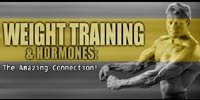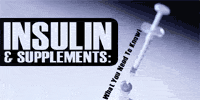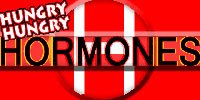But first, I'll give you the definition of hormone:
" Hormone (n) - a chemical that transfers information and instructions between cells in animals and plants. Often described as the body's chemical messengers, hormones regulate growth and development, control the function of various tissues, support reproductive functions, and regulate metabolism (the process used to break down food to create energy)." 1
So basically, hormones tell your body what it needs to do.
| RELATED ARTICLE | ||
|

The Hormones
 Insulin
Insulin
Insulin is a hormone that is made in the pancreas. Insulin's job is to keep blood sugar levels from rising too high. When you intake a carbohydrate (let's say grape juice, for example), your body releases insulin to regulate your blood sugar levels. The body is constantly trying to maintain homeostasis, or internal equilibrium.
Therefore, it does not let its blood sugar levels drop too low or become to high. The glucose is transported to muscle tissue and fat cells, lowering blood sugar levels. This is where insulin becomes very important to bodybuilders. Insulin is very anabolic because it increases the body's ability to uptake amino acids.2 It is believed that the best times to create an insulin spike is when you wake up and after a workout.
 |
||
 |
What Does Anabolic Mean? Anabolic refers to the metabolic process that is characterized by molecular growth, such as the increase of muscle mass. Thus, it means "muscle-building" in most common bodybuilding contexts. |
 |
 |
||
This is because your insulin sensitivity is highest at these times.2 To create an insulin spike, a food with a high GI rating is needed. An example of this would be honey. Eating honey, along with your protein shake, will cause an insulin spike and bring glucose to your muscles and increase your amino acid uptake.
 |
||
 |
What Does 'GI' Stand For? GI is an acronym for 'Glycemic Index'. |
 |
 |
||
Insulin has also been shown to stop protein breakdown after a workout.6 So insulin replenishes glycogen storage, increases amino acid uptake, and stops protein breakdown.
 |
||
 |
What Is Glycogen? Glycogen is the principal stored form of carbohydrate energy (glucose), which is reserved in muscles. When your muscles are full of glycogen, they look and feel full. |
 |
 |
||
Before you start drinking a bottle of honey, however - insulin also has a downside. Insulin also plays a role in storing fat. When insulin is released, it causes the liver to store glucose as glycogen.
This is fine when your liver needs its glycogen level replenished, such as after a workout. If the liver is saturated (or already full) of glycogen, however, any extra glucose will be transported to fat cells.4
| RELATED ARTICLE | ||
|
 Glucagon
Glucagon
Glucagon is a hormone that is also produced in the pancreas. Its job is also to regulate blood sugar levels. Unlike insulin, however, glucagon is released when blood sugar levels are low.3 In order to raise the body's blood sugar level, glucose is needed. Because there is a shortage of glucose, the body has to turn elsewhere to get it.
 |
||
 |
What Is Glucagon (Not Glycogen)? Glucagon is a hormone produced by the pancreas that stimulates an increase in blood sugar levels, thus opposing the action of insulin. |
 |
 |
||
First, glycogen stored in the liver is used. So, where does the glucose come from next? You guessed it, muscle.2 Glucagon stimulates the breakdown of muscle. Muscle breakdown will occur to supply the body with glucose to regulate blood sugar levels.
 |
||
 |
Glucagon History In the 1920s, Kimball and Murlin studied pancreatic extracts and found an additional substance with hyperglycemic properties. Glucagon was sequenced in the late 1950s, but a more complete understanding of its role in physiology and disease was not established until the 1970s when a specific radioimmunoassay (a scientific method used to test hormone levels in the blood without the need to use a bioassay) was developed. |
 |
 |
||
To stop this from happening, you want to eat low GI foods, which will supply your body will glucose without causing the blood to release massive amounts of insulin to absorb it.

Desired Blood Sugar Level
Your body want to keep its blood sugar level within a certain range. The desired range is between 70 mg/dl and 110 mg/dl ("mg/dl" means "milligrams of glucose per 100 milliliters of blood").5

Summary
Insulin can be very anabolic. To use this to your advantage, try to create an insulin spike after your workout. This is the most important time to do this. Another prime time would be when you wake up. You do not want to bombard your body with insulin, however, because it can be fattening.
| RELATED ARTICLE | ||
|
It is important not to let your blood sugar level drop too low, also. You do not want to lose muscle just because you are not eating. To keep your body running properly, eat low GI foods during the day. This will keep you body from using muscle protein for energy and releasing large amounts of insulin.
References:
- "Hormone," Microsoft® Encarta® Encyclopedia 99. Copyright © 1993-1998 Microsoft Corporation.
- Paul Delia, "Insulin, Glucagon, Glucose, Fat and Muscle: Understanding How These Elements Interact Can Help You Build Muscle and Burn Fat." [link]
- "Glucagon," Microsoft® Encarta® Encyclopedia 99. Copyright © 1993-1998 Microsoft Corporation.
- "Physiologic Effects of Insulin." [link]
- "Insulin Regulation of Blood Sugar and Diabetes." [link]
- John M. Berardi, "Solving The Post-Workout Puzzle - Part 2: The Recovery Plan." [link]
Recommend this article to a friend by e-mail by clicking here!
Thanks,



